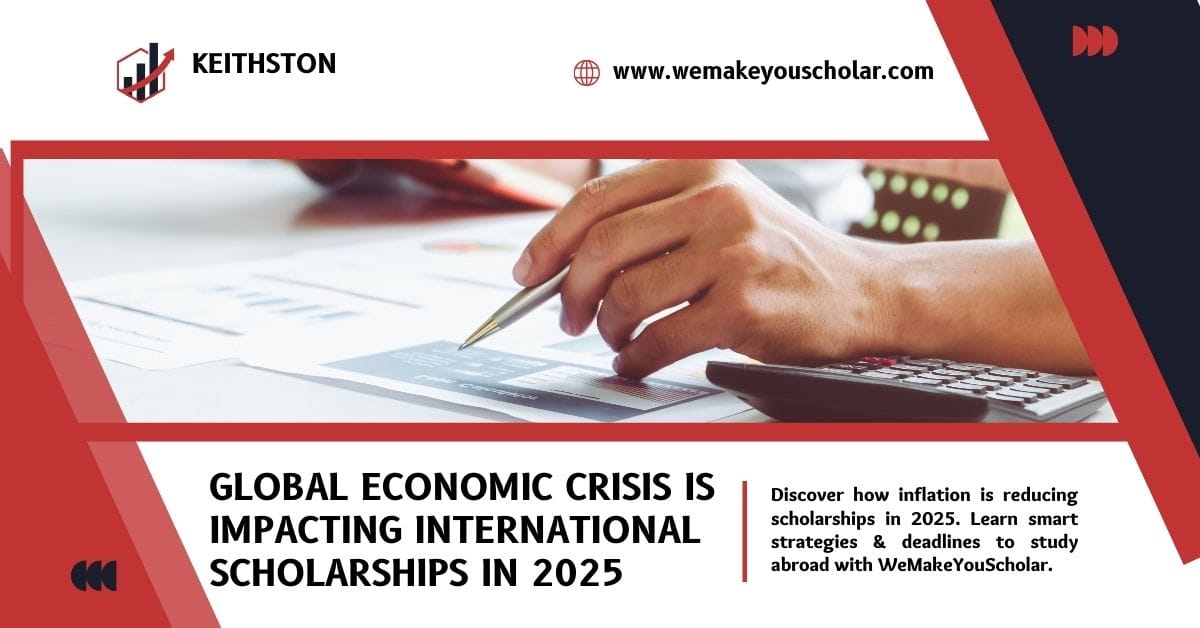How the Global Economic Crisis Is Impacting International Scholarships in 2025
The Global Economic Crisis in 2025 is characterized by uncertainty, with inflation, global trade war, supply chain disruptions due to conflict in which international scholarships are funded and allocated.
For students — particularly those from developing nations — this translates into less financing, increased competition, and need to plan strategically their educational journey.
Global Inflation: The Root Cause
As of the World Bank’s Global Economic Prospects Report (Jan 2025), the world’s inflation is still stubbornly high at 5.2% average, fueled by:
- Long-term geopolitical tensions (Russia-Ukraine, Middle East instability)
- Volatility in energy and food prices
- Slowing down supply chains and post-COVID debt overhangs
This directly affects government-funded or economic performance-linked scholarship programs.
Example:
UK’s Chevening Scholarship had its funding reduced by 12% this year versus 2023.
Australia Awards cut available spaces by more than 800 in 2024–25 as a result of budget cuts.
Decreasing Budgets & Lowered Aid
International development aid is falling as well. The OECD announced a 5.7% fall in Official Development Assistance (ODA) in 2024 — the largest decrease since the COVID-19 pandemic.
Scholarships such as:
- DAAD (Germany) – Under greater scrutiny for grants to non-EU candidates
- Swedish Institute Scholarships – Cut off several countries from eligibility for domestic funding priorities
- U.S. Fulbright Program – Cut fellowships to Asia and Africa by 15%
Currency Devaluation & Its Effect on Students
Students from nations such as Pakistan, Sri Lanka, Nigeria, and Egypt etc are especially hard hit. Their local currencies have depreciated heavily in recent years:
- Country Currency Depreciation (2024–25)
- Pakistan (PKR) ↓ 22%
- Nigeria (NGN) ↓ 29%
- Egypt (EGP) ↓ 17%
- Argentina (ARS) ↓ 41%
This implies that even partial scholarships don’t cover full costs anymore, making it more difficult to cover visa and cost of living requirements.
Change in Scholarship Priorities
Scholarship organizations are also changing their focus areas:
- AI & Machine Learning
- Green Energy & Climate Change
- Public Health & Medical Sciences
- For instance, the Eiffel Scholarship (France) now provides higher priority funding to students applying in these areas, whereas others (e.g., general business programmes) score lower.
Growth of Online & Hybrid Scholarships
Thanks to lower cost, there is a significant 20% growth in hybrid or completely remote scholarship schemes.
- University of London now provides full master’s scholarships for online students
- Commonwealth Distance Learning Scholarships continue to grow, with new courses introduced in climate tech and AI
This provides opportunities for students who cannot afford to relocate, providing a flexible and economical route to international education.
What Should Students Do in 2025?
In order to remain ahead in this evolving environment, students must:
- Apply Early – Programmes close 3–6 months prior to high demand
- Monitor Global Trends – Inflation, currency movements, and political forces affect availability
- Select Strategic Fields – Concentrate on fields in demand across the world
- Diversify Applications – Don’t put all eggs in one basket; consider Hungary, Turkey, Malaysia, and China
- Use Sites Like WeMakeYouScholar.com – To receive daily updates, reminders, and fresh opportunities ahead of others
- Conclusion
The world economic crisis has made it more difficult for students — but not impossible. While money is tighter and competition is fiercer, well-informed and proactive students still have a good chance of winning top scholarships.
Here at WeMakeYouScholar.com, we’re dedicated to delivering to you not only listings, but analysis, information, and direction you need to be successful.




